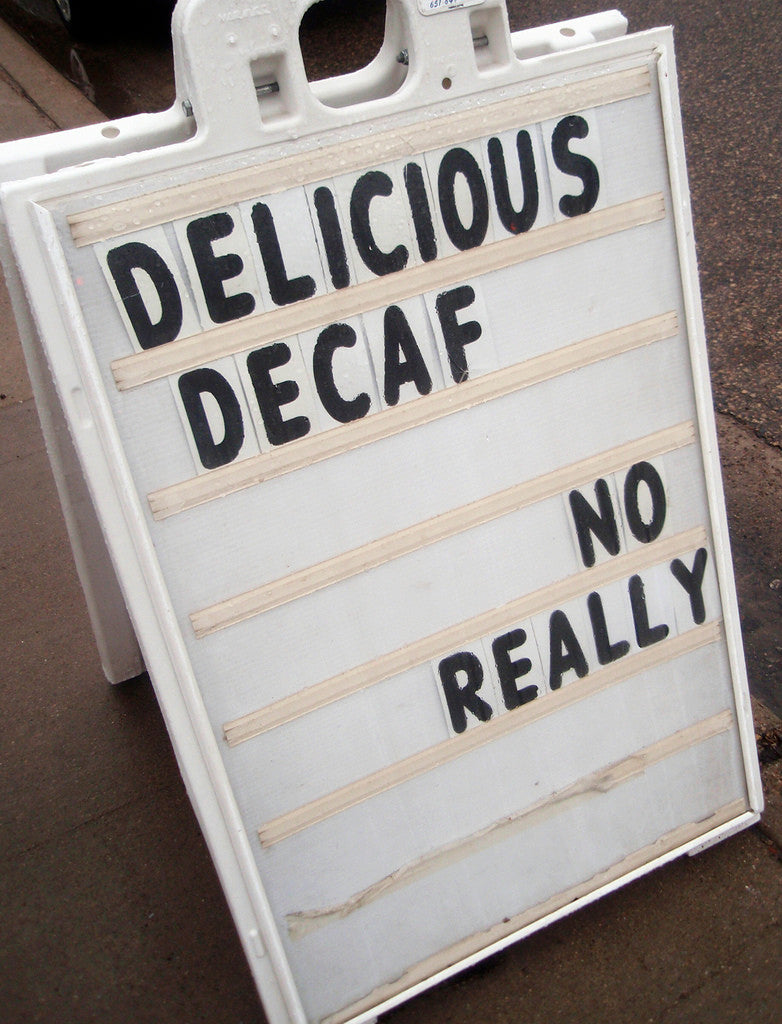
We Need to Talk About Decaf


Originally Posted April 16th, 2015.
Coffee plants produce caffeine because it is an effective organic pesticide, paralyzing and/or killing the insects who feed on its leaves and seeds. This is why Robusta, the commercial coffee species with the most caffeine, is also hardier (more robust, see) than Arabica.
In humans, caffeine usually only produces a mild stimulant effect (a lethal dose of caffeine in the average adult is equal to about 100 cups of brewed coffee, consumed all at once), but some people are more sensitive than others. Genetics predispose some of us to metabolize caffeine more slowly. Certain medications, like hormonal birth control pills, antibiotics, some asthma medications, and even echinacea, can also lead to slower metabolism.
For these and a variety of other reasons, some people want or need to limit their consumption of caffeine. It's hard to get a solid number on how many decaf drinkers there are in general, but about 12% of the coffee we roast at Red Rock is decaf.
But what does "decaffeinated" mean? And how is decaffeinated coffee made?
The international standard definition for decaffeination is that 97% of the original caffeine present in the coffee is removed. The EU standard is 99.9%.
Of course, different coffees start out with different caffeine content, so the amount of caffeine in a brewed cup can vary wildly: from 5 milligrams per 12-ounce cup to 32 milligrams in a 12-ounce cup of Dunkin Donuts' coffee, according to a 2007 Consumer Reports study. For reference, a regular cup of coffee can range from 150-300 milligrams.
And how exactly is caffeine, so integral a part of the plant, removed from coffee?
There are two general categories that decaffeination techniques fall into: solvent-based and non-solvent based. At Red Rock, we buy both kinds: the former method is used to decaffeinate our conventional coffee, and the latter is used for Organic decafs.
The majority of the decaf green coffee we buy is decaffeinated in Germany using methylene chloride. Very, very basically, coffee is boiled in water until most of its caffeine (as well as its flavor elements) are extracted. Then that water is separated and MC is added. It selectively bonds to the caffeine molecules and then the water is heated up so that the solvent and caffeine evaporate (MC has a very low vaporizing point). Then the water, left with its original oils, is added back to the beans, restoring a fraction of the original delicious coffee flavor (that's why decaf tastes like it does). I am aware that the name "methylene chloride" sounds pretty scary, but only trace elements survive the decaffeination process, and there's logically no way it could be left on the bean after roasting, due to the aforementioned low vaporizing point (like, around 100 degrees. Roasting heats the beans to between 385 and 430 degrees or so.)
Organic coffee must be processed without added solvents. Therefore, the Organic decafs we buy are decaffeinated using the Swiss Water process. Swiss Water decaffeination starts in much the same way as any decaf: green beans are soaked in hot water until its caffeine and flavor elements are extracted. Then, that water is passed through a charcoal filter so that the caffeine molecules are extracted. This leaves three parts: nearly flavorless, nearly caffeineless green coffee; extracted caffeine; and caffeine-free flavor water. At this point, the original green beans are dumped and the flavor water is used to decaffeinate another batch of green coffee. Wait, but HOW? When boiled in the flavor water, caffeine is extracted as usual, but more coffee flavor is retained in the beans. It's pretty much voodoo.
Swiss Water process is more expensive and tastes somewhat worse than MC decaf. The advantage is obviously for those who really don't want to consume something that's been in contact with industrial solvents.
Decaf coffee is harder to roast than regular coffee because boiling the green beans degrades them and leaves them dehydrated. They roast faster, less evenly, and more unpredictably. Very dark decafs are usually much more bitter than very dark regulars (our Decaf French Roast is not roasted for as long or as hot as our regular). Therefore, one of the best things you can do to enjoy good decaf flavor is buy medium roasts.
For a long time I had the feeling that decaf was languishing while the rest of the coffee on the market got really, really good, but I think producers of excellent coffee don't really want to have crappy decaf, so it's catching up. Kenneth Davids over at CoffeeReview.com has published several reviews of decafs scoring over 90 points.
We have a bit of a cult who buy our decafs, and I'm proud of that. Decaf drinkers deserve great coffee, too.
